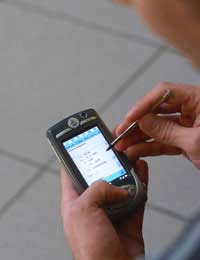Mobile Phones & Communication

“I’m on the train!” How many times have we all heard people say that, bleating into their mobiles? It seems as if everyone carries a mobile phone these days, they’ve become a commonplace. It’s perhaps hard to believe that back in 1993 they were the size of bricks, carried in briefcases, and people stared when they saw someone talking into one.
These days we’re connected, at home, on the road; almost every minute of our lives someone can reach us or we can call someone. Even when we’re driving we can use a Bluetooth to stay in touch. About the only place free from communication is in the air, and those regulations are changing, meaning that mobile phone use will be allowed on aircraft.
Has it all gone too far?
You & Your Mobile Phone
We use our landline phones for talking, pure and simple. They might store numbers, take messages, but all the features actively involve communication. But what about our mobiles? Yes, we use them for communication, but they’ve also become entertainment centres, containing, games, music, video, even connecting us to the Web and more. To make full use of your mobile phone these days, you need advanced communication skills.Talking has become just one facet of the mobile phone’s capabilities, and if we believe the ads for them, a minor one, at that.
But is being so constantly available a good thing? Yes, it can help businessmen, who spend days texting and talking on smartphones. Texting has become the main form of communication between the young as a way of keeping in touch with friends. For most of us, though, all this communication does is raise our stress levels. We’re at the beck and call of everyone at any time.
We managed perfectly well, and the wheels of industry revolved smoothly long before mobile phones appeared. Is it a coincidence that stress levels among the population have soared since mobile phones became ubiquitous? Is life much richer for being in touch all the time?
Listen to the mobile phone conversations all around you. How many of them are necessary? The answer, invariably, is very few. Mobiles are useful in an accident, or if your car breaks down, or if you’re running late to meet people, but all too often we use them for trivial purposes.
The Problem With Mobile Phones
Back when we could only talk on landlines, talking on the phone was only one part of life. These days we let mobiles rule our lives. We turn them off reluctantly for meeting or in cinemas and theatres, and check them regularly. If a call comes, all too often we take it – never mind what else is happening.Thanks to mobiles, we now believe that being able to keep in touch excuses lateness. The social skills we once took for politeness have been replaced by communication skills. Many of us act – especially the young – as if being permanently connected is a good thing (you can instant message on mobiles and access social networks). We’ve been seduced into the technology society.
Mobile phones are a good thing; their benefits outweigh their faults, and we can hardly undo progress. But we’ve made icons of them. We buy new models like they were fashion items, want all the latest gadgets on them, even though we may never use them. We’re slaves to our mobiles. Take time and ask yourself – is that a good thing?


Re: Has Email Replaced Letter Writing?
i love the points on here!
Re: What are the Negative Effects of Video Games on Society?
I visited multiple sites however the audio quality for audio songs present at this website is…
Re: How a Young Generation Accepts Technology
Hi there! Would it be possible to get an email address I could send a copyright request to? The Educational…
Re: How a Young Generation Accepts Technology
Young generation accept technology happily because they do every thing eg.shopping online
Re: How Video Games Became Major Entertainment
hi i'm doing a passtion project for school on video games became major entertainment and the question i'm trying…
Re: Has Online Shopping Made Life Easier?
Nowadays, buying on the internet has become even easier than ever, because of platforms that help you to pay such as…
Re: How a Young Generation Accepts Technology
who else is researching this for school?
Re: How a Young Generation Accepts Technology
like what majusa93 said, "Hello, I was wondering if you could tell me something about the author of this…
Re: Has Online Shopping Made Life Easier?
I like online shopping since it has things shops might not always have in stock
Re: How a Young Generation Accepts Technology
Hello, I was wondering if you could tell me something about the author of this article, how is he connected to…